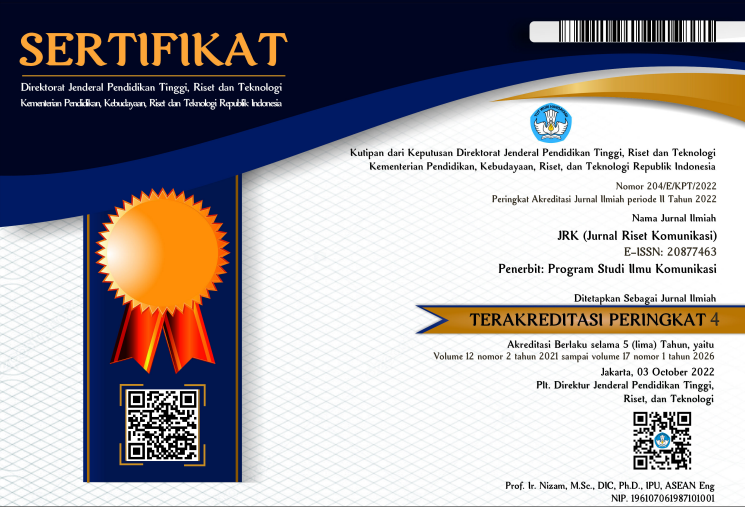The Influence of Partai Solidaritas Indonesia (PSI) Positioning Toward Brand Awareness on Novice Voters in West Java
Abstract
Full Text:
PDFReferences
Aaker, D. (2014). Aaker on Branding.
Jakarta: Gramedia Pustaka Utama.
Abdalla, F. (2018). KPU Sebut Jumlah
Pemilih Pemula 1,2 Juta Jiwa.
Retrieved from
https://mediaindonesia.com/read/de
tail/177343-kpu-sebut-jumlahpemilih-pemula-12-juta-jiwa
Darmawan, D. (2014). Metode Penelitian
Kuantitatif. Bandung: PT Remaja
Posdakarya.
Handayani, D. (2010). The official MIM
Academy Coursebook Brand
Operation. Jakarta: Esensi
Erlangga Group.
Hikmawati, F. (2017). Metodologi
Penelitian. Depok: Rajawali Pers.
Keller, K. L. (2013). Strategic Brand
Management: Building,
Measuring, and Managing Brand
Equity. New Jersey: Prentice Hall.
Mustafidah, & Taniredja, T. (2011).
Penelitian Kuantitatif (Sebuah
Pengantar). Bandung: Alfabeta.
Partai Solidaritas Indonesia. (2018).
Mengenal PSI, Partai Milenial
Peserta Baru di Pemilu 2019.
Retrieved from
https://psi.id/berita/2018/02/20/me
ngenal-psi-partai-milenial-pesertabaru-di-pemilu-2019/
Sekaran, U. (2006). Metode Penelitian
Untuk Bisnis 1. (4th ed). Jakarta:
Salemba Empat.
Sugiyono. (2011). Metode Penelitian
Kuantitatif, Kualitatif dan R&D.
Bandung: Alfabeta.
Sugiyono. (2014). Metode Penelitian
Kuantitatif, Kualitatif dan R&D.
Bandung: Alfabeta.
Surachman, S. A. (2008). Dasar-Dasar
Manajemen Merek. Malang:
Bayumedia Publishing.
DOI: http://dx.doi.org/10.31506/jrk.v10i2.6562
Refbacks
- There are currently no refbacks.









